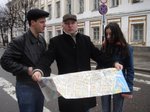I came to Russia aiming to improve my Russian from a 1- to a 1+. So I feel that my goals were clearly articulated. Though I have come to realize that a lot of students (and other folks) expect that a year in a foreign country will equate to fluency.
While that would be really great, language gain doesn't work like that. I am (if I do well) going to move up two bumps on the language chart. Don't get me wrong: two bumps is a lot! But as I have stated before, a 3 is translator quality in a foreign language. So being a 1+ allows you to communicate most things that you wish to, but it may be choppy and vague, at times.
As a for instance. I spent about 8 hours at a "dinner" conversing with some friends this past weekend. They don't speak a lick of English. But we talked. We communicated. They said, "We understand the points that you are trying to make. We can catch the drift if nothing else, but the grammatical mistakes make it hard to understand you at times... That and you have a pretty strong accent that makes it still even harder to understand you."
There are language gain programs out there. Namely, US military training for intelligence officers. Though the reason that Uncle Sam is able to turn a 0 (linguistically speaking) into a 2+/3- in the course of a little over a year is not just because it is a great program.
For one, the students there are professional linguist with a very high aptitude for languages. I have known a couple of guys who went there as a 0 in a foreign language (Arabic and Korean) and came out as 3-/3s. That is pretty amazing.
Though the military is a "language gain program", not a "study abroad program". Whereas the ACTR provides "study abroad programs", not a "language gain program".
Yes, you make great gains linguistically in he ACTR programs. I would strongly recommend the ACTR's programs over the other ones out there, but I feel that too many people expect too much from the program.
As the ACTR's website states, "The academic program is designed to improve participants’ oral, listening, reading, and writing proficiency in Russian language and to develop their knowledge of Russian history, politics, culture, and society."
In the military, the linguist are paid to sit in grammar class for endless hours a day. They are generally polyglots before they show up. (I've got one friend who went through the military's language program, he already spoke Russian, English, French and Spanish, all at the 3 level, when he went into the service, but he learned Arabic while he was there. Even he said that he met another fellow there that spoke 11 languages).
So there are some very gifted polyglots/freaks out there who pick up languages without much effort. I, sadly, am not such a person. If you have read this far into this posting, I am sure that you have already encountered many mistakes in my English!
So I would caution people coming here not to set unrealistic expectations. The ACTR did a fantastic job at orientation describing language gain and what sort of goals we should set. I would recommend reading up on language gain before studying abroad, in order to maximize your time overseas.
Poka!
Jason
Friday, February 23, 2007
Subscribe to:
Post Comments (Atom)

No comments:
Post a Comment